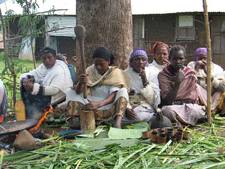Biodiversity & Culture, Society and Ethics

© A. k. Makarigakis
Coffee ceremony: the roasting coffee beans - Kafa, Ethiopia
Respect for biological diversity implies respect for societal and cultural diversity, as both elements are intimately interconnected and fundamental to global well-being and peace.
In today’s world, biological and cultural diversity – diversity of genes, species, ecosystems, landscapes and seascapes, and diversity of languages, livelihoods, values, knowledge systems, social and political systems, beliefs, spirituality and worldviews, are facing unprecedented change and, in some cases, erosion.
UNESCO contributes to efforts to counter the erosion of global diversity, both biological and cultural. Recognizing that together, cultural and biological diversity are vital building blocks for sustainable development, UNESCO seeks to develop innovative approaches:
- to promote understanding of the linkages between biodiversity and cultural diversity
- to raise awareness of the essential role of cultural diversity in sustaining and creating biological diversity
- to support the meaningful inclusion of local and indigenous knowledge in biodiversity conservation and management
- to mobilize cultural diversity to counter biodiversity loss, and
- to address ethical dimensions of biodiversity.
Societal values, norms and traditions shape our relationships with the living world, and ethics can help us to better understand and, as appropriate, re-orient these relationships. Ethical questions as they relate to biodiversity conservation, sustainable use and benefit sharing are among the issues to be addressed in the coming year.


